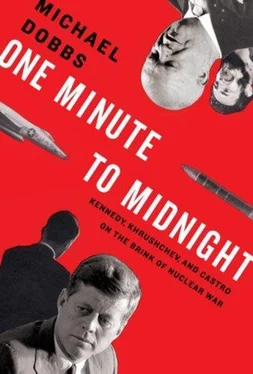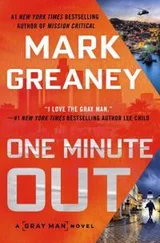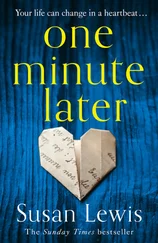The communications delays even extended to the emergency command posts that would be responsible for launching a nuclear war if the president was killed or a bomb dropped on SAC headquarters in Omaha, Nebraska. A Boeing EC-135 aircraft was in the air at all times, ready to order the destruction of Moscow or Kiev. When the missile crisis erupted, planners realized to their dismay that the “Looking Glass” planes lacked a device for authenticating emergency messages from the ground. On Thursday, they sent out a long top secret message describing how the authentication devices could be installed on board the airborne command posts. Many of the recipients of the message reacted skeptically.
“This is a joke,” the chief of naval operations scrawled over his copy of the proposal, pointing to a “4 to 9 hr delay in op immed msgs.” By the time an execution order was authenticated, Washington would already be obliterated.
The problem was even worse on the Soviet side. Some of their communications procedures were out of the nineteenth century. If the Soviet ambassador in Washington wanted to send a message to Moscow, it first had to be encrypted in groups of five letters. The embassy would then telephone the local office of Western Union, which would dispatch a courier on a bicycle to collect the cable. Soviet diplomats would watch the young black messenger cycling slowly down the street, and wonder if he would stop along the way to chat with his girlfriend. If all went well, the message would be transmitted to the Kremlin over a telegraph cable originally laid across the Atlantic a hundred years earlier.
At the State Department, officials tore off the latest message from Khrushchev from the teletype, analyzing it paragraph by paragraph. The department’s top Soviet expert, Llewellyn Thompson, who had served as ambassador to Moscow, was sure that Khrushchev himself had dictated the letter since it lacked diplomatic polish and sophistication. He was probably “under considerable strain.” Under Secretary George Ball imagined the “squat, morosely unhappy Chairman facing a blank wall,” pouring out his “anguish in every paragraph.”
The key paragraphs came toward the end. After insisting that the missiles had one purpose only—the defense of Cuba—Khrushchev suggested a way out of the crisis. If the United States recalled its fleet and gave a promise not to attack Cuba, “the necessity for the presence of our military specialists would disappear.” He compared the international situation to a knot in a rope that became tighter and tighter the more political rivals tugged at either end.
A moment may come when that knot will be tied so tight that even he who tied it will not have the strength to untie it. Then it will be necessary to cut that knot, and what that would mean is not for me to explain to you, because you yourself understand perfectly the terrible forces that our countries possess.
Consequently, if there is no intention to tighten that knot and thereby doom the world to the catastrophe of thermonuclear war, then let us not only relax the forces pulling on the ends of the rope, let us take measures to untie the knot.
For Ball, the message was a “ cri de coeur. ” Over at the Pentagon, Curtis LeMay was less sentimental. He told his cronies that the letter was “a lot of bullshit.” Khrushchev must believe “we are a bunch of dumb shits, if we swallow that syrup.”
7:35 P.M. FRIDAY, OCTOBER 26
As Khrushchev’s letter continued to come out of the teletype on Friday evening, Dean Rusk was closeted in his seventh-floor office at the State Department, listening to a television reporter named John Scali. The ABC News correspondent had a strange story to tell. Earlier that day, he had been invited to lunch by the KGB’s Washington station chief, Aleksandr Feklisov, serving undercover as a counselor in the Soviet Embassy. Over pork chops and crab cakes at the Occidental Restaurant on Pennsylvania Avenue, Feklisov had floated a plan for resolving the Cuban crisis that appeared to echo the conciliatory tone of Khrushchev’s latest message. As relayed by Scali, the proposal consisted of three points:
• The Soviet Union would dismantle its missile bases on Cuba under United Nations supervision;
• Castro would promise never again to accept offensive weapons of any kind;
• The United States would issue a formal pledge not to invade Cuba.
The proposal intrigued the secretary of state. If genuine, it could mark a breakthrough, a Soviet offer to end the crisis on terms that the United States could accept. The way in which the message had been delivered seemed a little odd: neither Feklisov nor Scali had previously been used as backchannel intermediaries between Moscow and Washington. But the Soviets presumably knew that Scali had good contacts at the State Department and was on particularly friendly terms with Rusk’s intelligence chief, Roger Hilsman. By sending the proposal through a KGB man and a journalist, Khrushchev could disown the concessions if Kennedy refused to negotiate.
According to Scali, Feklisov wanted a reply as soon as possible. He had provided his home telephone number so that he could be called overnight, if necessary. Rusk drafted a response on a yellow legal pad. He cleared the draft with the White House and handed the sheet of paper to the newsman. It contained a two-sentence message that Scali was authorized to convey to Feklisov at the earliest opportunity:
I have reason to believe that the United States Government sees real possibilities in this and supposes that the representatives of the USSR and the United States in New York can work this matter out with [UN Secretary-General] U Thant and with each other. My definite impression is that time is very urgent and time is very short.
Feklisov was still at the embassy when Scali called back. They agreed to meet in the coffee shop of the Statler-Hilton on Sixteenth Street. The hotel was three blocks from the White House, one block from the Soviet Embassy. By Scali’s watch, it was 7:35 p.m. when they arrived. They sat at a table in the back and ordered two coffees. Scali delivered Rusk’s message from memory, without revealing precisely who it was from.
“Does this come from high sources?” Feklisov wanted to know, jotting down the points in his notebook.
“The highest sources in the U.S. government.”
The KGB man thought about this for a moment, and then raised a new issue. He felt UN inspectors should be allowed into U.S. military bases in Florida and surrounding Caribbean countries to ensure that there would be no invasion of Cuba. Scali replied that he had no “official information,” but his “impression” was that such demands would create political difficulties for the president. Right-wingers in Congress and the military were pushing for an invasion.
“Time is of the essence,” Scali stressed.
Feklisov promised to convey the message to the “highest sources” in Moscow. He was in such a hurry to get back to the embassy, Scali later reported, that he paid for the coffee with a ten-dollar bill and did not wait for his change, most unusual behavior for a Soviet diplomat.
The encounter between the KGB agent and the reporter was a classic example of miscommunication between Moscow and Washington at a time when a single misstep could lead to nuclear war. Scali may have thought that he was being used as an intermediary to resolve the crisis—he certainly convinced the State Department and the White House that this was the case—but this was not at all the way the Soviets saw it.
Feklisov had been rummaging around for insights into U.S. government decision making since the start of the crisis. The onetime control officer for the Rosenberg spy ring was painfully aware of the pitiful state of Soviet foreign intelligence in the United States. He was under huge pressure from Moscow to come up with “secret information” from Kennedy confidantes. Since he lacked sources in the administration, he had to gather what crumbs he could from the outer rings of the circle. Well-connected reporters like Scali were the closest he could get to the Camelot court.
Читать дальше












